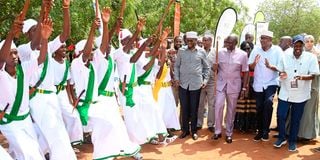Premium
President Ruto defends livestock vaccination campaign

President William Ruto, Wajir Governor Ahmed Abdullahi, (left) Environment CS Aden Duale (right) and Wajir North MP Abdullah, Bashir Sheikh join Wahir High School boys for a dance during the closing ceremony of the 4th Pastoralist Leadership Summit 2024 in Wajir on December 10, 2024.
What you need to know:
- The President says the exercise is essential for creating a disease-free environment.
President William Ruto has defended the national livestock vaccination campaign targeting 21 million cattle and 50 million small animals, including sheep and goats.
Speaking during the 4th Pastoralist Summit in Wajir, President Ruto emphasised that the initiative is essential for creating a disease-free environment and enhancing Kenya's access to international markets.
"This vaccination exercise will help create a disease-free country and open new market opportunities for our livestock products. We haven't given livestock the attention it deserves. By vaccinating livestock on a national scale, we will not only ensure the health of our herds but also improve our export potential, which will have a direct impact on the economy," he stated.
President Ruto criticised those opposing the nationwide livestock vaccination programme. He emphasised its importance in combating Foot-and-Mouth Disease (FMD) and Peste des Petits Ruminants (PPR).
"We have been fighting these diseases ever since I was born. Anybody opposing vaccination to eliminate FMD and PPR is simply misguided and unreasonable. Or maybe they don't have cattle, maybe they don't understand what this is all about. So, when we are having this conversation about animal vaccines, just shut up," he said.
The President further highlighted the critical role of livestock in the economic transformation of Kenya, particularly in arid and semi-arid regions.
Sinister motive
He underscored the importance of focusing on livestock, ranging from dairy to beef, as a significant contributor to the country's GDP.
"Livestock can contribute much more significantly to our GDP if we have the correct policy initiatives, appropriately funded, and provide an off-take mechanism for our livestock keepers," he said.
The Head of State was responding to claims by a section of opposition politicians, led by Wiper leader Kalonzo Musyoka, who claimed that the government had a sinister motive for the vaccination.
“The nationwide programme, set to roll out in the coming months, is being marketed as part of the government’s environmental protection efforts. However, this proposal reeks of a sinister foreign agenda and is deeply concerning to pastoralist communities and the nation at large,” Mr Musyoka said on November 16.
He urged Kenyans to reject the proposal, claiming the vaccines would alter the genetic structure of livestock, ultimately causing animals to "cease emitting methane gas into the atmosphere".
According to Mr Musyoka, this could lead to severe health and environmental consequences.
While in Wajir, President Ruto announced the establishment of the Livestock Marketing and Products Board. This new initiative is crucial for organising pastoralists into more structured and economically viable units, ensuring that they can access markets more equitably.
"From next week, we can identify and appoint the leadership of the livestock marketing board. And it must include women. By next Thursday, we should have that pastoralist marketing board appointed. We will work with the leadership of the pastoralists to identify the right people who understand how we want to move ahead together," he said.
Reduce losses
The President urged pastoralists to collaborate with counties to ensure proper equipment, such as special knives, are used in the skinning process. This, he explained, is crucial for maximising the potential of hides and skins, which could serve as valuable products for export.
“We need to work together, especially with the counties, to ensure that the right tools are available. This will not only improve the recovery rates but will also reduce losses, which we have seen due to improper skinning practices,” he emphasised.
The President emphasised the need to expand markets for meat, skin, hides, and other livestock products.
“This project will be a game-changer for Kenya's leather industry. We are not just processing hides, but creating an entire value chain that includes the production of shoes, bags, and other leather products. We are committed to ensuring that our pastoralist communities are equipped and trained to earn from their hides and skins, which will ultimately benefit the economy," he said.
He further stated that this initiative also aligns with Kenya's efforts to position itself as a major player in vaccine production in Africa.
He noted that all the vaccines will be sourced from KEVEVAPI since it has enough locally produced vaccines and even more, as they are exporting to nine countries in Africa.
“We have the capacity to produce vaccines locally, and this is a major step towards reducing our reliance on imports. The vaccines will be made in Kenya by Kenyans. This is about creating a sustainable, locally-driven solution," he said.
The summit, themed ‘Unlocking Policy and Financial Bottlenecks to Mainstream Pastoralism in Kenya,’ aims to address critical challenges facing pastoralist communities and highlight the sector’s pivotal role in Kenya’s economy.
Key issues on the summit’s agenda include the impact of climate change on drought and floods, improving governance in pastoralist regions, strengthening the livestock economy, and integrating pastoralist economies into the national development agenda.
The gathering t has attracted a wide range of participants including governors, members of parliament, policy experts, development partners, and representatives from the United Nations.





